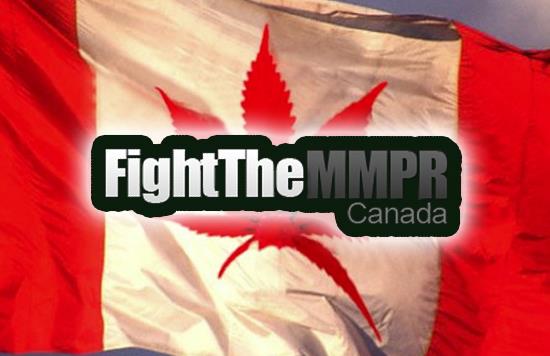Corporations prepared to profit at patients’ expense
By Ted Smith
Dramatic changes to the Canadian medical cannabis scene are on the horizon.
Patients are about to collectively suffer when the new Marijuana for Medical Purposes Regulations replace the Marijuana Medical Access Regulations. Commercial producers are eager to attract venture capitalists to make a lot of money in the future medical cannabis industry and beyond. Sitting in the middle, compassion clubs appear more vulnerable and yet more necessary than ever.
Apr. 1 is the day the MMAR is over and the MMPR takes full control. It is the day corporations rip this plant from patients. For that reason, Apr. 1 is a good day to go to Ottawa and protest.
It seems the only hope for patients to actually retain their permits to grow will be the injunction being filed by veteran lawyer John Conroy. He and other lawyers are representing the MMAR Coalition Against Repeal, a group of patients and caregivers across the country who are trying to raise the funds to support this expensive legal action.
Donations have been dismal, especially given how many patients currently use the program, with just over $30 thousand raised so far. However, a recent push has secured several large donations from a few organizations, and a large benefit concert is planned for Nov. 13 in Vancouver. With the total costs expected to reach over $250 thousand as this case is likely to go to the Supreme Court of Canada, the group has its work cut out for it both in and out of court.
This injunction should force the federal government to continue to issue personal licenses to grow. The first stage of this legal fight should be over by Apr. 1. By that time, we should know whether there will be a temporary reinstatement of the MMAR until the higher courts resolve the matter, or the first attempt to keep the MMAR alive failed and the coalition is the side appealing.
No matter how that court battle goes, no doubt we are dealing with a hostile federal government that will fight back every step of the way.
That has been the case with the Owen Smith trial, where last year BC Supreme Court Justice Johnson ruled the MMAR was unconstitutional for not allowing patients and their caregivers to make cannabis extracts. That ruling has been appealed and will be heard on Dec. 6. However, Health Canada did not acknowledge this case even existed when it cited relevant court cases in the supporting documents that came with the MMPR.
Owen was arrested in 2009 while making food and skin products for the Cannabis Buyers Club of Canada, now called the Victoria Cannabis Buyers Club. Charges of possession of cannabis and possession of THC were eventually dropped by the Crown after the judge made his ruling. Unfortunately, Health Canada seems to have done nothing to consider implementing the judgment in the new programs, except for issuing statements suggesting patients can do whatever they want with the herb when they get it home. This statement does not remove the real legal risk that patients face when making hash, tea, or butter, nor does it help those patients unable to continue making their own products.
Apparently even the province of B.C. is worried about this gap in the program and the prices patients will pay under the new system. According to the Georgia Straight, in an “issue note” to the federal government written in May, the BC Ministry of Health expressed concerns about the MMPR only selling raw herb, dramatic increases in prices, and the original plans of allowing doctors to distribute cannabis from their offices. The plans to allow doctors to distribute were not included in the final regulations released in the summer.
Commercial producers appear ready to provide extracts, as they are already frothing at the mouth thinking of the money to be made in the new system. Several have indicated they intend to supply cannabis extracts in the future, though the only realistic chance of that happening soon seems to be if our court case wins. Canada is the only country in the world that allows the use of cannabis for medical purposes but does not allow the use of extracts.
As of press time, the only company to have obtained licenses to sell under the MMPR is Prairie Plant Systems, the same company that has had a complete monopoly on medical cannabis in Canada for years. In a clever plan to discard the company’s image after years of providing a poor product, which Health Canada forced them to do in the contract, PPS has formed a new company, CanniMed Ltd. It appears Health Canada has worked with this company, giving them these licenses well before any of the competition have a chance to establish themselves.
To the best of my knowledge, 156 firms have applied for commercial licenses so far. Whether those applications are complete is still to be determined, as there is a long list of requirements to be met. Many companies are investing well over one million dollars in setting up their business model. While some have claimed they will bring prices down eventually, many companies are looking to sell the cannabis at prices as high as $12 per gram, plus shipping.
Since these prices are beyond the ability of most patients to pay, the immediate effect will be a dramatic reduction in cannabis use by patients who had been growing enough to supply all of their needs. This severe change will seriously harm the ability of many to function, forcing them back to medications that often were not as effective and have harmful side effects, simply because these other medications are paid for by insurance companies and government plans. Provincial health care costs will certainly increase, as patients will have more hospital visits, more costs and complications from increased prescription drug side effects, and premature deaths.
If cannabis received a Drug Identification Number, it could be covered in insurance plans and by health care, but that seems unlikely any time soon. No plant has ever achieved a D.I.N., for the simple reason that the rules were written to identify and sell chemicals, and the variability in all plant species makes it virtually impossible for any to get through all of the requirements for consistency. No company is currently even trying to get a D.I.N., because the costs of doing the research are astronomical, and a company can only patent one strain or one specific combination of cannabinoids and terpenes.
With patients certain to suffer if the MMPR is brought into effect without allowing personal plant cultivation, many feel the urge to travel to Ottawa on Apr. 1 and express their discontent. Already people from all over the country are pledging to attend this one opportunity to collectively show this government and the people of this country that this is wrong. Hopefully this rally will help further convince the opposition parties of the absolutely ridiculous nature of the war on drugs, as almost everyone attending is likely to become a criminal once again for using this simple plant as medicine.
Many patients will continue using and growing cannabis despite losing the legal protection to do so. It is just a matter of time before some of these folks start getting arrested, especially those with a Designated Grower license that the police have been made aware of because of robberies, complaints, or other incidents. Apparently, Health Canada cannot release the information they have about the locations of licenses to grow, but we will see if that is how things work out.
Meanwhile, dispensaries have never been part of the old program and also seem to be excluded from the new one. However, with the market opening up to allow commercial producers to compete and the access problem possibly being fixed, some compassion clubs are considering packing up and going home before getting busted. Others are looking at possible methods of merging into the new program by turning the society into a mail order/delivery business, where the group could have a mailbox business next door or have a bike courier show up at your door quickly. Since many clubs have relied upon DGs for medicine, it is attractive to them to adapt into the new system. Others prefer working as legally as possible.
However, it seems most compassion clubs are going to ride this out and see what happens. Clubs are not likely going to become targets overnight because the MMPR are in effect. There are many reasons why medical dispensaries will be very important, at least in the initial stages of the new program. If the new program is accessible to patients because more doctors sign the new forms, if the costs are brought down considerably and if extracts are made available, then clubs would no longer be able to justify continuing to operate.
Those are some big if’s.
As for the Victoria Cannabis Buyers Club, we will hold present course. With the trial of Owen Smith coming up in Dec., a decision is not expected until much later than Apr. 1. That decision will hopefully secure our position here in Victoria, forcing the federal government to consider including extracts in the MMPR and store-front dispensaries. Until that time, dispensaries like the VCBC have at least one good reason for keeping their doors open.




